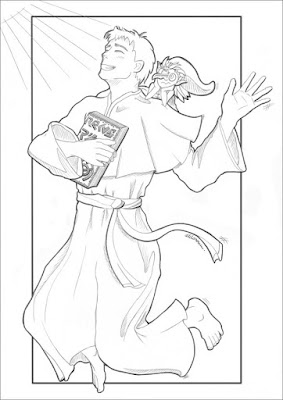Story for the Day: Myndil Plodostirr
Myndil is one of the many characters in the upcoming Creatures of Fairytale and Myth. He is a missionary, one that davers over the landscape looking for novitiates, and while he always seems to talk his way out of trouble, new enemies are never far behind.
An introduction:
Life happened to most people, but Myndil Plodostirr happened
to everybody else. Where other men had grown up with the usual complaints of harsh
mothers, small dinners, and work to be done after daily lessons, Myndil had a
comfortable home at the orphanage, a good establishment with right-minded well-meaning
matrons and masters, where Myndil was tricked into an early education and out
of physical labour, where his natural understanding and high glee were wasted
on addled children who knew no more of kindliness than they did their daily
prayers. Other orphans had nominal friendships: knowing they were going to be
adopted and separated from one another, they kept their schoolfellows at a
distance, limiting their friendships and rivalries to grades and games. Myndil
never maintained the hope of being taken in by new parents, and he therefore
tried to befriend everybody, feeling himself loved enough by the Brothers and
Sisters at the orphanage and desirous of sharing their affection with everybody
else. He was not well-liked amongst his peers and had little idea of it; mantled
with childlike innocence, Myndil had no notion of how much his incessant
questions and demands to go shares in everything was a source perpetual irritation.
He begged to be allowed in every game, would invite himself to every
conversation, and would tell every story the Brothers and Sisters told them at
bedtime many times over. He was a great prattler for one so young, could talk
his way out of any situation he had got himself into, not from any want to be seditious,
but from a genuine desire of wanting to rally every rock and tree and child to his
cause. He wielded friendliness as a weapon and directed it at everyone who approached
him, children eventually grew tired of his blathering, the Brothers and Sisters
made the usual excuse of having work to do and fled, and Myndil accepted it all
with a shrug and an “Oh, well,” and turned his attention toward God.
God, he
said, had saved him: he was young when his mother died, and the great joke at
the orphanage that Myndil had talked his father into abandoning him. It was not
unreasonable to think that a father with no ability for raising children and no
affection for a rambling warbler would leave him in the care of those who could
love and mind him. Myndil, however, mostly cared for himself: he washed and
dressed on his own, he cleaned his teeth and tidied his room without being
asked, and once he was taught how to read, he would take a book from the
library and read it out loud for the benefit of the younger children. He was an
exemplary student, eager and busy, always ready to give his interpretation of
the passages, always in command of his pen and paper, and always raising his
hand without being asked. Whenever the Brothers and Sisters would ask Myndil
how knew the answer to their questions, he replied, “God told me.” This was endearing
at first, but after he had ended every lesson and received his due praise with
the same explanation, the Brothers and Sisters grew tired of Myndil’s admissions
and laid it down that he was merely ‘a good but peculiar boy who had learned
his book’. God had been Myndil’s first word, and he was much more sensible of a
higher power than any other child his age was. He spoke to God every evening,
said his morning prayer aloud, that everyone might hear him ask God why there
had to be raisins in the frumenty, why the gruel had to be so thin, why Maribel
liked to pull his hair after she had dug through the contents of her nose, and
why no one wanted to share his warm milk with him at night. He was suspiciously
unfazed by things young children were usually frightened of: he loved the dark,
because it was quiet and he liked to hear the sound of his own voice band
between the walls, looked forward to nightmares, because God would come and
save him at the end of them, and enjoyed the company of monsters, especially
the ones that corralled under the bed. Closet monsters were second rate and did
not factor into much of the conversation at night, fairies and night-hags at
his window listened in amazement at Myndil’s ability to charm the dust from the
walls. He talked with an ability beyond his age, he reasoned and coaxed without
disguise, and he grew up in tolerable ease under the glamour of a god who
neither made a public appearance or spoke to anyone but him.


Comments
Post a Comment